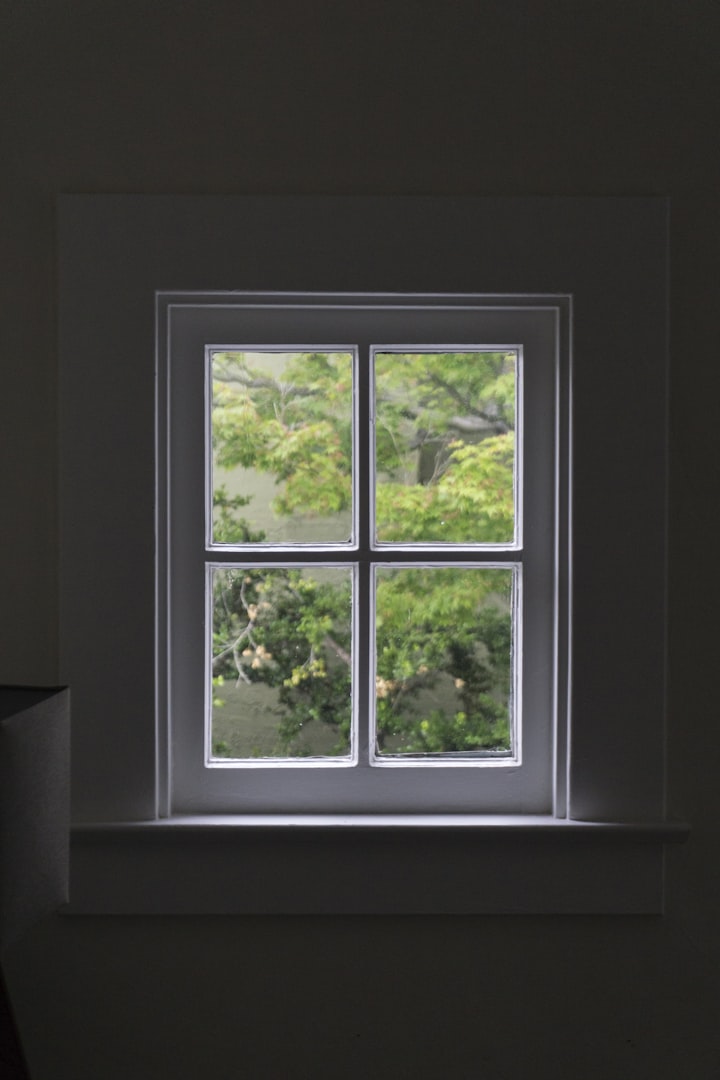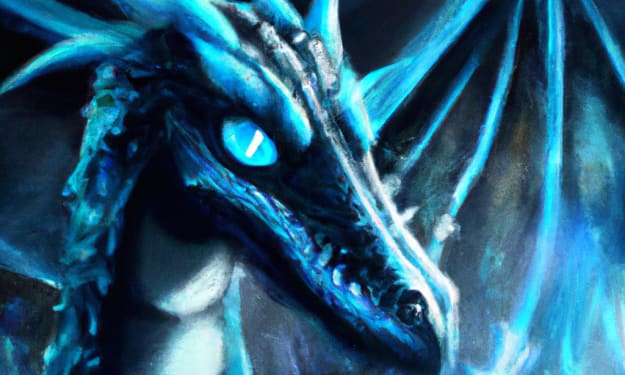
The outside world was unknown to her, but she could see a glimpse of it through the window in his room. Eliza stopped her daily household tasks and stood in the doorway. Hundred-year-old gray hardwood covered in undisturbed dust lay between her and that window. A single bed dressed in a simple gray quilt she'd woven from old, tattered cloth and a single, crisp white pillow. His journal lay on the quilt, dimpling the folds. An imprint of where his head last lay pressed into the pillow cloth, and his fading scent lingered in the thinning air.
She hadn't swept in over a year, not since that day. The day he was called away to lead their armies in the last battle.
She used to run up to the window almost every day when she was a little girl, a child, and a young lady. It didn't interest her much anymore. Her mother sat convalescing in her rocking chair that he had made for her sixty years ago downstairs in the living room, surrounded by her makeshift memories. They hadn't had any yarn for knitting for the past six months, and the food storage in the kitchen was waning. He used to bring back boxes of supplies.
Eliza always hoped for some sugar and baking goods so that they could make cookies or cakes. They read and re-read the same books. The family's book of ancient records sat prominently on the coffee table, where she and her mother would read from it every night before bed. It was a record of their ancestors from thousands of years ago, filled with prophecies that all since had happened. There were no new prophecies. The world was silent. The bustling cities had long since crumbled and overgrown by nature, or so her father used to tell them.
Eliza had never been outside the four walls of her home. It was impossible to leave. The Fathers and brothers had a sensor embedded in their skin upon birth that allowed them to come and go freely through the one front door tracking their health and location. The women had a micro, a tiny matter disorganizer device injected into their bodies, so small a microscope could only see it. If she or her mother crossed the threshold, they would disintegrate. This was done to preserve humanity. The world had been in chaos, plagues, famine, and war. Everyone was dying until The Seventh Right took over. Women's free will and men's lives were taken over and controlled by whatever The Seventh Right thought was necessary. As far as Eliza could tell, it only slowed the inevitable.
The Seventh Right had been in power for a hundred years, and the wars were still raging. The lives of those who wouldn't submit or would fight against The Right were lost. Some years ago, Eliza overheard the Inquisitor talking about the women's prisons. Women were taken prisoners of war and allowed to submit to The Seventh Right. If they fought and refused, their eggs were removed, they were executed, or they were imprisoned and forced into surrogacy, where they were artificially inseminated and lived in highly guarded facilities called Communes. The state raised the babies. The boys went to military schools, and the girls were taught to become mothers, married off, and assigned a home.
Eliza shivered, wrapping her arms around her body and pulling her gray shawl tighter around her shoulders. She'd even heard her father talking recently about a facility where artificial wombs were growing human embryos; many of them had made it full-term. They were being raised in the women's communes. Soon women wouldn't be needed for procreation anymore.
Eliza thought about looking out the window. She could only see the dark night and the stars twinkling in the sky. She looked at the floor and sighed. If she crossed the floor, she'd have to sweep it. Eliza played these little games with herself. It was her rebellion. She wanted to see just how dusty the floor could get; then she'd measure it, tell her momma, and her mom would smile secretly.
There was just that one window in the house. In his room.
When a woman was to be married, her micro was temporarily disarmed until she crossed the threshold of her husband's house. Women were a part of the house and property to be cared for and to take care of their families; abuse wasn't tolerated, however, and was strictly forbidden. Physically injuring any human outside of battle was grounds for immediate death. The emotion called anger was forbidden. Their health was also tracked and recorded continuously through a health chip embedded in the micros, through a government health care database. They would get a visit from the district Inquisitor if anything were amiss. If it were severe enough, a team of healthcare coordinators would come and treat the women in their homes.
Eliza gazed dreamily around her father's room. He was a kind man and doted on her as much as possible. While fighting in the wars, he took his share of spoils and even once brought her back a doll. A doll that had been made with plastic and paint, just like the ones sold in stores over a hundred years ago. It was well preserved, and its hair was just a bit ratty. She combed it lovingly for hours, practicing hairstyles her mother showed her.
She had to hide it whenever the district Inquisitor came, though. Her father was a member of The Seventh Right and a prominent general. The Inquisitors traveled around the villages inspecting the houses making sure everything was in order. They removed bodies and were the only ones with the power to inject and deactivate the micros. They also enacted death protocols. If someone was sentenced to death, they were the ones to press the button. The generals and soldiers had orders from the high council to gather and incinerate all traces of the old world from the villages, cities, and towns they occupied during battle.
Eliza saw the controller one time in the district Inquisitor's hand. He would keep it out, visible to intimidate and frighten the women. She imagined what it would be like to steal it and deactivate her and her moms' micros. Could they slip out through the door disguised as men? Where would they go?
The Seventh Right fought neighboring countries where Eliza and her mother had heard whispers of lands where women were generals, soldiers, teachers, and doctors. She overheard her father's conversations with the Inquisitors, which intrigued her. There were lands where women could travel freely outside and wherever they pleased. They could learn more than just reading, writing, math, and sewing. You were lucky if your home had a piano and your husband allowed you to study music. Before he left, her father had talked to her about a man, he was going to have her married, too, but he would wait until he got back. He didn't want her mom to be alone.
Populations were dwindling. Particularly the men. The wars started a hundred years ago when people died due to pollution and pestilence. The balance of powers in nature had shifted, too. Rodents and cockroaches had overrun many villages. The larger mammal populations were dense or extinct because of climate change; some natural processes expedited by the Industrial pursuits of humankind had made the air toxic, and only some pockets of the earth had cleaner air. Every home had powerful air filters, many had stopped working fifty years ago, and the government hadn't been good at keeping up with repairs.
People started eating dogs and cats shortly after crops failed and stores closed. Eliza had read about it in the book of histories and ancient texts.
There used to be large buildings where people bought things made by people and businesses. There had been things like ice cream and bread, meat and fruit, and vegetables. You could choose what you wanted and buy it at the store.
Eliza daydreamed about what that must have been like. Farming was controlled by the government now in large buildings with indoor greenhouses, all run by men and distributed to the generals according to their family's size and needs. Additional provisions were provided if a general was being deployed, but not much.
"Eliza," her mom's cracked, soft voice broke the silence.
Eliza glanced one last time at her father's empty room, closed the door, and wondered if he was alright. He'd never been gone this long before.
The old, gray wood-slatted stairs creaked from the cold and age under Eliza's feet as she returned to the living room. The room was lit by a small lamp and warmed by the fire burning cheerfully in a small fireplace. Her mother rocked silently with a brown shawl draped across her shoulders and a thin flowery embroidered blanket on her lap.
"Come and sit with me. It's getting late," her mother said.
Eliza sat on the sofa next to her mom.
"Your father should be getting home tonight. I can feel it in my bones."
She had said this every night for the last four months, and Eliza wasn't so sure anymore.
One thing was certain; if the door unlocked and no one was there, it meant he was dead. The Inquisitor would be auto-notified, and they would be reassigned. She would likely be married, and her mother exterminated. Older women were sentenced to die if their husbands died. They assured them it was quick and peaceful. She knew that her mother was feeling anxious. As far as any woman in any house knew, they could be the last people on the earth. They only had each other to talk to. Eliza tried to imagine a home of her own, alone without her mother or father until she had a child, and then at least she'd have some company and things to do to make the time pass quicker.
That night the wind blew harder than Eliza had ever heard it blow. After a chicken noodle soup dinner and warm milk, her mom went to bed early. They shared a room; her mom didn't like sleeping alone, and husbands and wives didn't share beds, but Eliza wasn't tired yet, so she stayed up, straitening the kitchen and dusting the living room, cleaning out the ashes from the fireplace crate and getting things ready for a cold morning. There was a large cellar under the kitchen pantry floor where food and wood were stored. Eliza hated going down there. It was cold but dry, like a basement with no windows. Every home had only one window and door to help conserve heat and energy and to help keep the women inside. The men stocked the storeroom.
Eliza went down the stairs to get more firewood for the fireplace, which was only allowed during the coldest winter months. This December had been especially cold. Temperatures dipped well below freezing; how deep Eliza didn't know. Televisions and radios had long since been banned and were only briefly taught in the governments' homeschool curriculum as a great historical mistake, creating idle, self-centered societies full of entitled selfish behaviors. Her mom had seen one once when she was a little girl growing up in her home. Her father had an old one he'd salvaged from an occupied city. He'd pull it out now and then, and they'd see if they could find a show. That worked for a while until all the towers had been knocked down and the satellites disabled. Eliza wasn't sure how they did that, but whatever they did had worked because, according to her mom, one day, there just wasn't anything left to watch.
Eliza thought about these things a lot, like reruns in her imagination. She liked to try to piece together what the world used to look like, like a puzzle with pieces that looked like they should fit but didn't. She grabbed as much wood as possible and tried to hurry back up the cellar stairs.
A loud bang threw her back off the stairs and onto the cement floor. The house shook and creaked as another loud bang rattled the house once more. A bright light flashed through the wood slats of the cellar door. The earth shook violently. Eliza tried to get back up but fell again as dust shook itself free from the ceiling and shelves. Barrels and boxes tipped over, spilling the contents on the floor.
Eliza lay there for a moment with her arms covering her head as debris fountained down from the ceiling where the blast had caused it to crack. The house groaned.
Eliza's head was buzzing, her ears ringing. She tried to pull herself up. Her heart was pounding violently. She gasped and tried to find her voice.
"Mom!" she screamed, but it only came out as a strangled whisper.
"Mom," she called again while sliding her broken body to the stairs. She lay on the bottom steps for a moment until she felt tingling in her legs and circulation rush back into her muscles. They felt heavy, but she pushed herself to stand and gripped the stairs, climbing the rest of the way up.
The house was still standing, though she half expected to find it completely gone. The house creaked and groaned, but the walls remained firm. The kitchen cupboards were wide open, half swinging on their hinges. The contents of the cabinets and fridge lay strewn all over the room. Eliza stumbled through the kitchen to the hall and forcibly made her way to the front room and then the stairs.
"Mom!" she called again. Fear gripped her body but willed her forward. The living room was mostly okay, with just some things falling on the floor from the shelves and mantle. She willed her legs to move one step at a time and coughed against the dusty air. Some stair boards had come loose and cracked or splintered from the blast. She stepped carefully but as quickly as her body allowed. Her bones hurt, and it hurt to breathe. She wondered if she had broken bones. Maybe her ribs were cracked. If so, the Inquisitors and medical staff should show up soon to help them. That at least gave her some reassurance for the time being.
When she reached the top, she glanced at her father's door. It was open and swaying eerily just a little into the room. Eliza could see the shattered window and, through it, a light in the distance over the hills. She pulled herself towards the room and leaned against the door frame to support herself. A cold breeze blew in from the now-opened window. Eliza closed her eyes and breathed it in, still in shock, she did not yet feel the pain that would later encompass her body from her injuries, but she had not breathed such deliciously cool air in so long. The smoke from the fires in the distance had not yet tainted the fresh, clean air, but it soon would.
There, in the distance, all around the hills were on fire. The bomb sirens wailed faintly from far off north towards the capital village. All the cities had been destroyed, but the capital village was where all the most prominent compounds and medical facilities were stationed. Where The Seventh Right gathered and met with the heads of state, that's where her father would have returned and reported first after fighting before returning home to spend a little time with them before being deployed again. She knew this because her father had pointed it out many times, telling her stories about the capital village and what it was like there. That's where the heads of state families would have been stationed in their homes that Eliza now realized were likely no longer there. Her heart sank and a lump caught in her throat. The fires of war lighted her only window now to the outside world.
Eliza tore her eyes away from the horrific scene and made her way to her and her mother's room. The room was primarily okay except for some of the roof buckled and cracked, spilling insulation and splintered wood beams down into the room. Her mother knelt by the side of the bed, clinging tight to the quilt.
Eliza ran to the bed and knelt beside her, wrapping her arms around her. Her mother shivered and opened her eyes, gazing at Eliza, still frozen with fear.
"What's happened," she managed with a shuttered breath.
"I don't know. It's something bad, though; the hills are on fire," Eliza explained.
"Oh," her mother coughed.
"Come on, let's get you back into bed."
Eliza quickly cleared the debris off the bed, shook out the blankets, and then helped her mom back under the covers. She grabbed a blue crocheted cat she'd made her mom many years ago that she secretly gave her for her birthday. Such things weren't celebrated and hadn't been since The Seventh Right took over. Still, Eliza had heard about them from her mom, who had heard about them from her mom and dad, and she thought they sounded delightful, so she had secretly made her mom a birthday present one year, and her mom had held it close to her every night since then.
She clutched the cat so tight and closed her eyes.
"I love you, Eliza," she whispered and drifted off to sleep for the last time.
Eliza sat in her mom's rocking chair the next night after spending the day sweeping and cleaning, and repairing what she could. She'd bandaged her cuts and bruises, made ginger and turmeric tea, and changed her clothes. It was hard changing in her room with her mom lying lifeless under the covers. The inquisitors and medical chiefs hadn't come yet. Only the smell of smoke and the sound of the frigid winter wind blew through the house. She'd never been outside and could only see the corner edges of roofs to the east and west of their home through the one window in her dad's room. She wondered if everyone else was all right. She needed to cover the window in her dad's room, but it would seal up her only view of the outside world. The house was getting so cold.
The fire crackled, and Eliza just stared into the flames. The heat felt good on her face. The house groaned against the increasing wind, and the front door clicked open.
Eliza turned her head slowly and stared at the door for a minute before slowly standing up and letting her mom's blanket slide to the floor.
"Dad," she whispered into the darkness.
Her legs were sore, and her feet felt strange walking towards the door. Snow blew in through the door, swaying on its hinges and creaking.
There was no answer.
Eliza placed a hand on the door and peered around it. A gaping black void engulfed the view, filled with faint white dots of snow swirling in the air. She just stood there looking at the empty door frame. A sinking feeling overcame her as she realized she might be alone in the world. Her father was dead, her mother and perhaps the entire human race. There must be others, she wondered.
Should she wait for the Inquisitor? It had only been a day since the bomb. She stood stunned, staring at the threshold. If she stepped through the door, she could be obliterated or free to look around and see what was on the other side of the house. She was free to leave and find her way to a state where women had more choices. The thought excited and terrified her. She could close the door, and it would lock. She could cover that window and sweep the floor in her dad's room, Live on the food she had until it was gone, and someone came for her. Or slowly starve to death. Or she could walk through the door and see what happens.
She took a deep breath, kept her eyes open, and walked through the door.
The End.
About the Creator
Amy Black
I am an American contemporary poet and author specializing in speculative YA, adult fiction and children's stories.
https://www.facebook.com/amyblackfiction






Comments
There are no comments for this story
Be the first to respond and start the conversation.